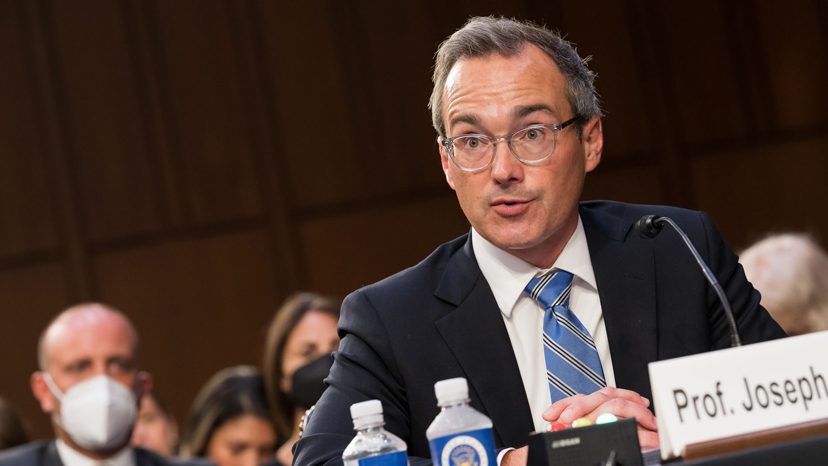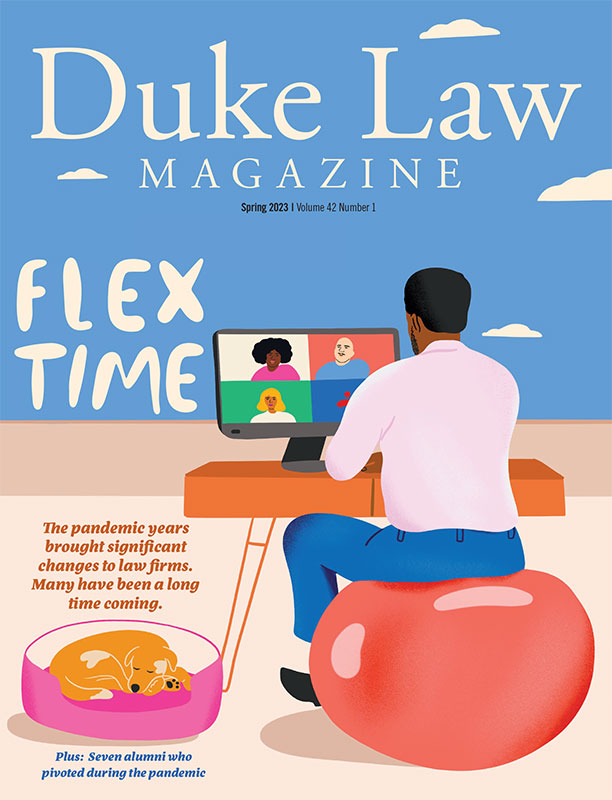Spring 2023

In testimony before the Senate Judiciary Committee on July 20, Lanty L. Smith ’67 Professor of Law Joseph Blocher said that a recent Supreme Court ruling expanding Second Amendment rights will have a significant impact on efforts to protect public safety. The hearing was convened to consider how gun violence might be curbed following mass shootings at an elementary school in Uvalde, Texas, and a Fourth of July parade in Highland Park, Ill.
Blocher’s testimony included an analysis of how the Supreme Court’s ruling in New York State Rifle & Pistol Association v. Bruen will change the way courts determine whether a gun law or regulation is constitutional. Beyond striking down New York’s gun licensing regime, the Court adopted a new test that says a gun law must have an analogue in text, history, and tradition. That is a marked departure from the two-part test courts have long used, which allows them to consider whether a regulation addresses a concern, such as public safety, that overrides any infringement of individual Second Amendment rights.
Blocher told legislators that the Court offered little guidance on how lower courts should weigh competing historical comparators, which gives judges latitude to choose one that they favor.
“An under-specified analogical test like Bruen’s raises serious problems of administrability and invites judicial discretion and ideology to seep into decision-making,” he said. Second Amendment law going forward will be characterized by unpredictability as individual judges make their own determinations about whether historical laws are sufficiently similar or not to the ones they are considering, Blocher said. “Legislatures can and must continue to promote public safety, including through consideration of contemporary empirical evidence. Constitutional law must and will continue to reconcile history and common sense.”

Along with Melvin G. Shimm Professor of Law Darrell Miller, Blocher is faculty co-director of the Duke Center for Firearms Law and co-author of The Positive Second Amendment: Rights, Regulation, and the Future of Heller (Cambridge University Press, 2018). The two are serving as co-chairs of the new Association of American Law Schools (AALS) Section on Firearms Law. The section marked its inaugural gathering at the January AALS Annual Meeting in San Diego with a panel discussion, “Gun Rights and Regulation after Bruen.” Miller moderated the panel, which addressed outstanding scholarly questions raised by Bruen.

Testifying before the House Financial Services Committee on Feb. 8, Professor Gina-Gail Fletcher cautioned against opening unregulated private markets to investors of relatively modest means without also requiring robust financial disclosures from issuers.
Multiple proposals in the House of Representatives aim to lower the qualifications for who gets to invest in companies seeking capital on the private market, which are currently limited to “accredited investors” — determined by such criteria as having individual or joint net worth of at least $1 million, or individual annual income of over $200,000.
But Fletcher, an expert on complex financial instruments and market regulation, said doing so without improving consumer protections and disclosure requirements would increase investor risk, not investor choice, and even put the economy at risk. Private offerings are not regulated by federal securities laws, and issuers are not required to provide information like audited financial statements, thereby opening the door to unsupported valuations. She called those markets “an insiders’ game” where even well-educated investors would be betting their money on “unproven, opaque investments.”
“Allowing retail investors [to invest in] private offerings will simply expose them to a market that is inherently uneven in the distribution of information and increase the likelihood that they are victims of fraud,” she said. “These characteristics are a feature, not a bug, of the private markets and will certainly result in retail investors being exploited by low-value private offerings and losing their hard-earned investments.”
Fletcher is a board member of the Healthy Markets Association, an investor-focused not-forprofit coalition focused on improving the capital markets, and a member of the SEC’s Investor Advisory Committee.

Professor Veronica Root Martinez has co-authored Securities Litigation, Enforcement, and Compliance: Cases and Materials, 5th (West Academic, 2023), with Donna M. Nagy and Lisa M. Fairfax. The new edition expands the casebook’s focus to include the prevention, detection, investigation, and remediation stages of compliance in the securities industry, with topics including the role of gatekeepers, monetary awards, and statutory protections for whistleblowing, corporate internal investigations, deferred prosecution agreements, and requirements under the Foreign Corrupt Practices Act and federal anti-money laundering statutes.
Martinez researches and writes about issues related to professional and organizational ethics, drawing on scholarship from the areas of ethics, compliance, corporate and securities law, workplace law, and equity and inclusion. She is one of the nation’s foremost experts on corporate compliance. Her book, Building an Effective Ethics and Compliance Program, is forthcoming with Edward Elgar. She is also a leading academic expert on the role of monitors and monitorships and is currently serving a four-year term on FINRA’s National Adjudicatory Council.

Donald Horowitz, the James B. Duke Professor Emeritus of Law and Political Science, is the co-editor, with Helen Ting, of Electoral Reform and Democracy in Malaysia, (Copenhagen: Nordic Institute of Asian Studies Press, 2023). The book offers scholarly perspectives on an array of electoral reform issues pertinent to the situation in Malaysia, where proposed reforms were stalled by political unrest, and wherever else the matter is under consideration, particularly in countries transitioning from authoritarianism. Horowitz, who has written extensively on electoral systems, ethnic conflict and accommodation, and constitutional design, also contributed a chapter titled “Electoral System Reform” to the volume and co-wrote the Introduction and Afterword.

In a posthumous honor for Professor Emeritus Walter Dellinger, who died in February 2022, North Carolina Attorney General Josh Stein named fellowship opportunities in the Attorney General’s office the Walter E. Dellinger III Memorial Fellowship Program. The program hosts two fellows at the North Carolina Department of Justice, one in the solicitor general’s office and another in the general counsel’s office.
Dellinger, the Douglas B. Maggs Professor Emeritus of Law, served in a variety of roles in the federal government, including as assistant attorney general in charge of the Office of Legal Counsel and acting solicitor general of the United States. Dellinger also represented the State of North Carolina in several important cases, including three cases in the U.S. Supreme Court.
“I can think of no better inspiration for young lawyers than Walter Dellinger,” Stein said in a statement announcing the program on May 23. “Walter was a brilliant lawyer, but perhaps more importantly he was a kind and engaging man. I feel lucky to have been a friend. I hope naming this fellowship after Walter will inspire another generation of dedicated public servants.”

